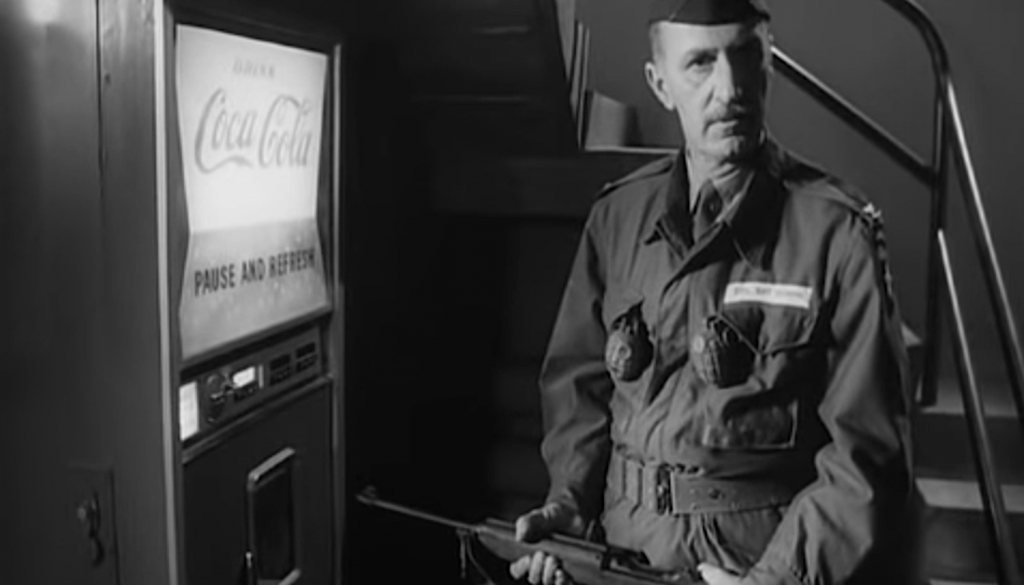One of my favorite movies is “Dr. Strangelove,” and there is a particular scene that always makes me laugh. Peter Sellers, as Royal Air Force officer Mandrake, is desperately trying to reach the White House via a pay phone (yes, there really were things called pay phones), in order to prevent World War III. But he is short of change to make the call that will prevent a rogue B-52 bomber from dropping its payload on the Soviet Union.
Thankfully there is a Coca-Cola vending machine nearby, and Mandrake asks a U.S. Army officer to shoot the machine in order to extract the necessary loose change he needs to save mankind. The incredulous officer asks first if RAF officer Mandrake is aware that the vending machine is “private property.” This sends Mandrake into an apoplectic rant over the ramifications if he doesn’t get to make his call. Finally, the U.S. soldier relents, but not before he warns the foreign sounding British officer, “You’ll have to answer to the Coca-Cola Company for this.”
Now Coca-Cola and a lot of other major companies are answering to groups that have insisted on a July boycott of paid advertising on Facebook for its apparent complicity in spreading “hate speech.” There are lots of claims and accusations as to what kind of hate speech Facebook is supposed to be supporting, but among the many I found — on Google — none of the hate speech centers around the destruction of religious statues or houses of worship.
Facebook has become a battleground. It has become a place where inhibitions evaporate and harsh words, some of them true, most of them either out-right false or negligible, abound. It has been a place where billions of dollars have been spent by advertisers like Coca-Cola.
The power of the boycott has been around for centuries. And it has been used to great effect, from boycotting English tea in Boston Harbor to boycotting California grapes. It’s a tool and like all tools, it is as good or bad as the person or organization that wields it.
Some examples of hate speech these groups have taken exception to include awful things like Holocaust denial and all manner of racialist venom. Then there are clear-as-mud examples of what these groups have lumped into the hate-speech barrel that seem surely to be highly charged political comments, but crossing the threshold of hate speech could be debated.
But honest debate is laid waste when differences in political positions are weaponized. The fact that some groups now seem to have control of the narrative and the power to designate all kinds of things “hate speech” should give us pause.
Again, there is no mention of the destruction of venerated statuary anywhere in the examples of hate speech these groups want the big companies to be concerned about. I think there’s a reason for that, and I think it is something serious Catholics need to keep in the forefront of their minds during these historic times.
The conversation that certain verses in sacred Scripture may include “hate speech” has already been judicated in the legal system of our northern neighbors in Canada. For now, Scripture is not designated hate speech there, but the very fact that it was part of the legal and official hate-speech legislation process in Canada is worrisome.
Video from this moment earlier. https://t.co/PXLMoT3s1c pic.twitter.com/WE6vHeEsJH
— Joel Currier (@joelcurrier) June 27, 2020
I may be cynical (actually, I am cynical) but I don’t believe the actions taken by Coca-Cola or the other companies involved in the Facebook boycott are the result of a keen sense of social justice. If they had that sense, they would have said something about the crazy things that are said on Facebook before groups got organized and threatened their bottom line.
Companies go where the money is. When it was profitable to portray the nuclear family living in suburban splendor in the ’60s and ’70s, that’s what they did. When it became profitable to advocate social change and “new” ways of being families, they did that too. And if the money says you have to consider elements in the Catechism of the Catholic Church “hate speech,” who do you think Coca-Cola will answer to?
It has been inspiring to see the bishop of San Francisco’s courageous spiritual exercise at the site of the blasphemed toppled statue of St. Junípero Serra and the courageous young priest standing between the statue of St. Louis facing down an angry mob, all of which I found on social media platforms.
But how long before the actions of these brave churchmen may be deemed too dangerous, too hateful, to be allowed a voice on Facebook and beyond? It leaves me stone cold.

